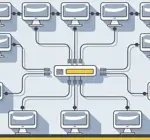Understanding and Troubleshooting any Game Server Manager
Understanding
A server manager is simply an interface that allows you to “speak” to your server. It provides a way for you to program your server with the correct information without know which files you need to locate and change. It also gives you a place to tell the server which ports it should communicate on. Depending on the manager, it can provide many wondrous features, or just a simple handful of features. This often times depends on the nature of the server manager. WindowsGSM for example can handle a very wide variety of servers, and due to this has many limitations like auto back up, or requiring you to manually locate each file for each server. Why does it work this way? Because all servers are different, they use different files in different locations, and there is no way for one manager to handle all the differences. Now a server manager that only handles on game, like ASA for example, can get down to the last detail because it knows all the files involved, where they are located, and that there will be no requirements for when a new game comes out.
Troubleshooting
Troubleshooting server managers comes down to a few key elements,
- IF the server starts, runs, backs up, and shuts down without errors, the server manager has likely done its job.
- There are errors in the above, Likely you told it wrong someplace along the way. If the server does not run it is not a port issue, it is most likely a command line issue or key software that is required for the server is missing (net framework for example).
- Your server starts and runs but you cannot find it in the list when playing a game, This is a communication issue, Either your server will not take anything but the default ports, the server manager ports are configured wrong, the ports are not open in the firewall, or you have other software blocking the communication.
- You didn’t set a static IP. When you run a game server you want to set a static IP on the computer that is hosting the server. Everything will work if you don’t but if you restart your computer or your router it can reassign a new IP which invalidates your port rules and causes your router to stop allowing traffic back to that computer.
When you run a server your home internet will let any information out into the WWW. the problem lies when you try to connect, through a game, back into your home internet. Your internet does not understand it is you requesting the information and so it blocks it. (to prevent mischief). You must tell all the software involved that this traffic is you and you approve of this transaction. For windows firewall, you will have to allow all needed programs through the firewall, for the router you will need to open the ports, telling the router to stop looking at these I am using them and you can’t stop me. Virus software can also block traffic thinking it does not belong. Another common program that will block traffic is when you are running “special” network card software like Intel Killer Wireless for example. The hard part is which of these in any and every combination is causing the problem.












